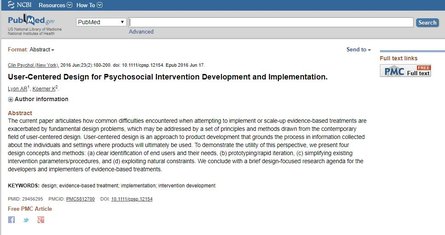
Abstract
The current paper articulates how common difficulties encountered when attempting to implement or scale-up evidence-based treatments are exacerbated by fundamental design problems, which may be addressed by a set of principles and methods drawn from the contemporary field of user-centered design. User-centered design is an approach to product development that grounds the process in information collected about the individuals and settings where products will ultimately be used. To demonstrate the utility of this perspective, we present four design concepts and methods: (a) clear identification of end users and their needs, (b) prototyping/rapid iteration, (c) simplifying existing intervention parameters/procedures, and (d) exploiting natural constraints. We conclude with a brief design-focused research agenda for the developers and implementers of evidence-based treatments.
